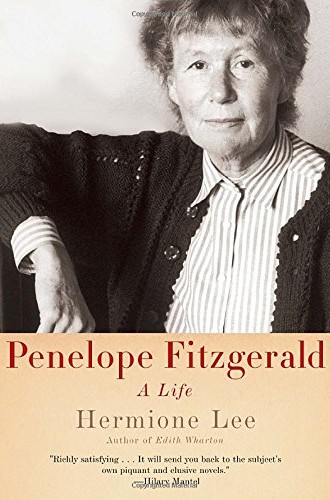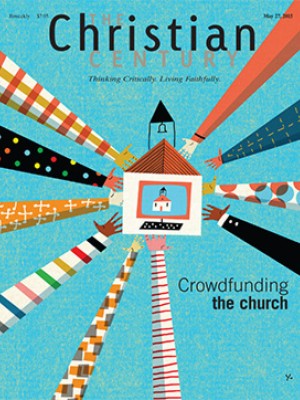Penelope Fitzgerald, by Hermione Lee
Decades before one of the greatest writers of the 20th century published a book, she tried to make ends meet by teaching at a girls’ school in London. The small salary helped keep her family living in a desperately unsafe houseboat on the Thames. One day she appeared in class looking even more distracted than usual. “I’m sorry I’m late,” she said in her self-effacing way, “but my house sank.”
Born to an illustrious family, Penelope Fitzgerald spent most of her life in poverty. She was 60 when she wrote her first novel and didn’t become famous until she was 80. Her novels are slender and comic, reflecting a tragic view of life. Fitzgerald often said that Christian faith lay at the heart of her work and that she wished she were “braver” so she could make it more explicit. In fact her faith is unmistakable, distinctive, and conveyed quite bravely.
Read our latest issue or browse back issues.
In this she was true to the celebrated Knox family. Both of her grandfathers had been bishops; her uncles Ronald and Wilfred, also ministers, wrote best-selling books. Her father, E. V. Knox, was editor of Punch. (In her affectionate biography The Knox Brothers, she characteristically honors them without mentioning herself.) Religious questions brought out their energies and wit. More personal matters, she admitted, they often kept buried.
Such reticence might not have shown at first in the “blonde bombshell” who was popular at Oxford, but it deepened throughout her painful marriage. Desmond Fitzgerald, a dashing war hero, had seemed a great match. Together they briefly edited a literary magazine not unlike Punch. But he drank, lost the magazine, lost his income, stole money from his law practice, and then was disbarred. Penelope spent the next two decades supporting him and their three children—barely. Often they went hungry, and for a time they were homeless.
By 1977, he had died and their children had grown. Against all odds, this was when she turned her personal experience into fiction. A disastrous year in a bookstore became The Bookshop, which was short-listed for the Booker Prize. The sinking of the houseboat became Offshore, which won it. Similarly, a wartime job at the BBC and a stint in a children’s theater provided the material for sparkling dark satires.
“I am drawn to people who seem to have been born defeated, or even, profoundly lost,” she wrote. Somehow Fitzgerald managed to combine great wit with empathy. Again and again in her fiction, secondary characters suffer terrible calamities, told almost in passing, so we hardly know whether to wince or laugh. There is a passage in the short story “The Means of Escape,” set in the 19th century, in which a Mrs. Watson loses two children in a fire, then tries to get herself arrested or killed. She is sent to a penal colony where no one seems to acknowledge her grief, least of all the clergy family who takes her in when she is on parole. She seems incidental to the story itself—even the reader may pay her little mind. By the story’s end, however, Mrs. Watson has sprung a delicious surprise on all of us who have looked past her.
Lest anyone think that Fitzgerald sought protection in Christianity, we come upon passages like this, from Offshore:
“It’s his own fault if he’s kind. It’s not the kind who inherit the earth, it’s the poor, the humble, and the meek.”
“What do you think happens to the kind, then?”
“They get kicked in the teeth.”
This is what is so brave about Fitzgerald’s faith, I believe—her unfashionable emphasis on the crucified. As her biographer, Hermione Lee, says, “She does not think people get what they deserve in this world, but she thinks this is not the only world there is.” Like her grandfather Bishop Edward Hicks, a crusader for the poor, and her favorite uncle, Wilfred Knox, whose book Meditation and Mental Prayer she so admired, Fitzgerald could face the world with clear and open eyes because she also sensed the unseen.
One of her protagonists, a rational Englishman among the Russian Orthodox in prerevolutionary Moscow, experiences faith in The Beginning of Spring. “Because I don’t believe in this, Frank thought, that doesn’t mean it’s not true. . . . Perhaps I have faith, even if I have no beliefs.” Another, the son of a clergyman in 1912, has left faith far behind and thinks science has proven that the body cannot have a soul, until he goes through the gate of angels, for which the novel is named. (Fitzgerald originally planned to call that book Mistakes Made by Scientists.) She explained to an interviewer, “I’m a Christian, and I have to stick by—I don’t have to—but I do stick by what I believe in.”
At first some critics underestimated Fitzgerald, and she played along as if she had taken up writing as a grandmotherly hobby, like making jam. Eventually the so-called literary world recognized her genius. Having initially drawn on her personal experience, Fitzgerald made a daring departure in her last four novels, writing about times and places removed from her own, and she had a knack for including just the right details. Accolades poured in. “The finest British writer alive,” judged the Los Angeles Times. Astonishingly, four of her novels were short-listed for the Booker Prize; just as astonishing, The Blue Flower, her greatest masterpiece, was not. “How does she do it?” asked A. S. Byatt. “How does she know these things?” echoed Julian Barnes. These were question reviewers asked again and again.
Hermione Lee’s biography tries to answer. She has gathered just about every scrap of information about Fitzgerald’s life—there is only so much—and has uncovered some of the sources Fitzgerald used in researching her novels. The resulting partial explanation of how she did it in no way diminishes the wonder.
“On the whole,” Fitzgerald once said, “I think you should write biographies of those you admire and respect, and novels about human beings who you think are sadly mistaken.” Taking that advice, Lee has “written out of love and admiration for her work, curiosity about her life and a belief in her genius.” Fitzgerald certainly did not make it easy for her biographer. She kept few records of her life, voiced few private thoughts, and sometimes misled interviewers just for the fun of it. If this biography cannot quite explain her brilliance, it may inspire us to rediscover it. Here is laughter, great emotion just below the surface—plus something else that makes us shiver.






